11 October 2024
Weekly Market View
When good news becomes bad news
US stocks scaled record highs and the US 10-year government bond yield once again rose above 4% after a surprisingly strong jobs report for September revived expectations of an economic soft-landing.
The equity rally could have legs if US corporate earnings once again beat subdued expectations.
Nevertheless, history suggests a sharp spike in bond yields in a short period typically leads to a short-term pullback in risk-assets. Also, equity volatility is likely to rise heading into the US elections in November. Against this backdrop, we would average into bonds, which look relatively attractive after the latest surge in yields.
In China, we remain selective in some consumer-driven equity sectors pending any announcement of a large fiscal stimulus. In India, the latest dovish shift in the central bank’s policy stance is positive for Indian government bonds.
In FX markets, we see downside risks for the EUR/AUD amid widening interest rate differentials.
What is the outlook for China equities as fiscal stimulus expectations build up?
Should we add Developed Market Investment Grade bonds now?
How to position for the EUR ahead of ECB’s policy meeting next week?
Charts of the week: Risks and opportunities from bond yields surge
A sharp spike in bond yields is potentially negative for stocks near term, but provides an opportunity for bond investors
US 10-year government bond yield and moving averages
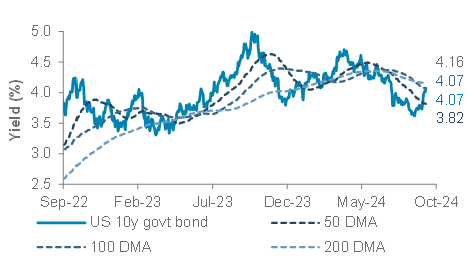
Correlation of w/w change in US 10-year bond yield to S&P 500 return; US 10-year bond yield 3m change
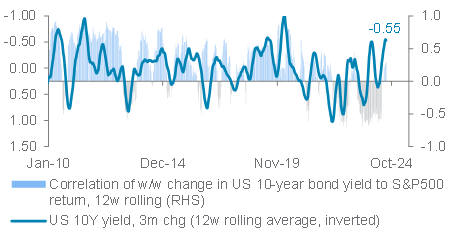
Source: Bloomberg, Standard Chartered
Editorial
When good news becomes bad news
US stocks scaled record highs and the US 10-year government bond yield rose above 4% after a surprisingly strong jobs report for September revived expectations of an economic soft-landing. The equity rally could have legs if US corporate earnings beat subdued expectations. Nevertheless, history suggests a sharp spike in bond yields typically leads to a short-term pullback in risk-assets. Also, equity volatility is likely to rise heading into the US elections in November. Against this backdrop, we would average into bonds, which look relatively attractive after the latest surge in yields. In China, we remain selective in some consumer-driven equity sectors pending any announcement of a large fiscal stimulus. In FX markets, we are bearish EUR/AUD amid widening interest rate differentials.
Strong US jobs report upends bond markets: A stronger-than-expected US job market report for September has led to a paring back of Fed rate cut expectations, driving bond yields higher. The policy sensitive 2-year US government bond yield surged more than 30bps, while the 10-year yield rose over 25bps since the jobs report. Also, US inflation in September was higher than expected, while minutes from the Fed’s last meeting showed policymakers were divided on the outsized 50bps rate cut in September. This raises the chance of just 25bps rate cuts in each of the remaining two meetings this year. The market is pricing a total of 140bps of Fed rate cuts over the next 12 months vs. 175bps before the September jobs report. We would average into bonds to lock-in higher yields over the longer term. The key risk to bonds is a ‘Republican sweep’ of the White House and Congress in the elections, which could lead to higher fiscal deficits. Also, a dramatic surge in oil prices due to any disruption in supplies remains another risk.
Impact of higher rates on equities: While the S&P500 index hit a record high following the strong jobs report and a pullback in oil prices this week, historical data suggests a 20-30bps jump
in the 10-year bond yield over a three-month period has caused the correlation between bond yields and the equity market return to turn negative (equities fall as bond yields rise). Given this, any further rise in the US 10-year bond yield could raise the risk of a pullback in equity markets.
Remain selective in China: Meanwhile, China equity volatility has surged as stocks pulled back sharply amid disappointment with the lack of guidance on the size and nature of any fiscal policy measures. A briefing on Saturday by China’s finance ministry could provide more details, although any concrete measures are more likely to be announced after the US election uncertainty is over. Also, data from the Golden Week holidays showed a decline in per capita consumption. We expect market volatility (and uncertainty) to remain high in the coming weeks, given the risk of increased trade tensions after the US elections, especially if former President Trump returns to power. Given this, we remain selective in China, adding to laggards in our preferred consumer-related equity sectors (see page 4).
India’s monetary policy shift positive for bonds: The Reserve Bank of India shifted its monetary policy stance from restrictive to neutral as the growth outlook cools, partly due to tighter fiscal policies and tightening credit conditions amid high real rates. The monetary policy shift is positive for our tactical view on Indian government bonds, which offer relatively attractive yields among Emerging Markets. The inclusion of the bonds in another major global benchmark should attract further foreign institutional flows. We also prefer the more resilient large cap stocks within Indian equities.
Bearish on EUR/AUD: The decline in Euro area inflation below 2% for the first time since 2021 likely sets the stage for another 25bps ECB rate cut next week. Meanwhile, the Australian central bank is likely to hold policy at least until early next year as inflation remains elevated. Against this backdrop, we see further downside for the EUR/AUD pair in the coming weeks.
The weekly macro balance sheet
Our weekly net assessment: On balance, we see the past week’s data and policy as neutral for risk assets in the near-term
(+) factors: Resilient US labour market, global central bank easing
(-) factors: Rising EU/China trade tensions, ongoing Middle East conflict

The US labour market remains resilient
US non-farm payrolls and unemployment rate

US inflation was higher than expected in September
US core, supercore* and shelter inflation, 3-month annualised
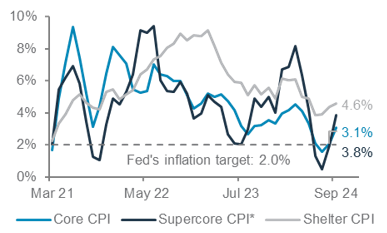
German factory orders slumped in August, in yet another sign of the manufacturing sector’s woes
German factory orders m/m
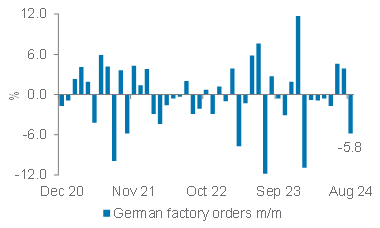
Top client questions
What is the outlook for China equities as fiscal stimulus expectations build up?
Markets were disappointed earlier this week as no concrete details of fiscal funding was announced during the National Development and Reform Commission (NDRC) meeting. However, the NDRC’s mandate is to formulate strategies, set objectives and coordinate macro policies, not announce specific policies. A fiscal policy package is still likely on the way, with the NDRC emphasising that “next steps would involve coordinating with relevant departments to expand effective investment”. The markets will be watching for the press conference this Saturday from the Ministry of Finance, as well as the NPC standing committee meeting at the end of Oct-24.
The Hang Seng Index broke below the resistance-turned-support level at 20,500 post the announcement. It is near the 61.8% Fibonacci level, from the range over the last few weeks (from 17,000 to 23,200). Recall that 20,000 to 22,500 is our base case, while 18,000 to 20,000 is our bear case, should the fiscal stimulus underwhelm market expectations. We believe the index is going to trade at the weaker-end of the base case, or the stronger-end of the bear case, before any further significant government announcements. Investors may consider adding incrementally to laggards in the consumer-related sectors, such as consumer discretionary and communication services.
— Daniel Lam, Head, Equity Strategy
In our base case, the Hang Seng Index (HSI) is likely to be volatile within the 20,000-22,500 range, pending any significant fiscal stimulus announcement
HSI 5-year median, resistance, Base/Bull/Bear scenarios
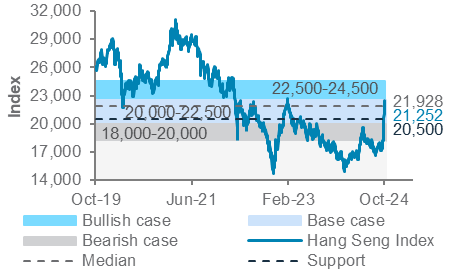
Should we add Developed Market (DM) Investment Grade (IG) bonds now?
The US 10-year government bond yield surged above 4% this week, driven by stronger than expected employment data. Technical indicators, such as the 14-day Relative Strength Index, have reached the “oversold” territory, suggesting an increased likelihood of a reversal. Additionally, the 10-year yield is currently testing a key technical resistance level at 4.07%, with the next resistance level at 4.17%.
As the money market has scaled back expectations for rate cuts and is now more aligned with the Fed’s projections, we believe the risk-reward profile of US government bonds is more attractive than it was a few weeks ago. Given this, we see an opportunity to raise exposure while maintaining our view that rate cuts remain on the Fed’s agenda. Our 3-month target range for the 10-year US government bond yield is 3.50-3.75%. The key upside risk is inflation expectations bottoming amid (i) stronger-than-expected growth data and (ii) higher oil prices against the backdrop of rising geopolitical risks in the Middle East.
For DM IG corporate bonds, the yields are more attractive today than a couple of weeks ago. However, their yield premium over government bonds has declined to the lowest level since September 2021. Hence, we maintain a core allocation (Neutral) to DM IG corporate bonds.
— Cedric Lam, Senior Investment Strategist
The risk-reward balance for US government bonds has become more attractive than a few weeks ago
US 10y government bond yield
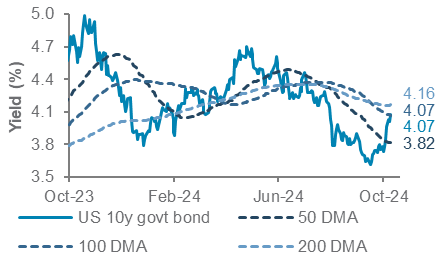
Top client questions (cont’d)
Following the RBA minutes, do we expect rate cut in December? What do we expect from the ECB next Thursday, and how do we view EUR/AUD?
The Reserve Bank of Australia’s minutes from their latest meeting highlighted a discussion of different scenarios for either lowering or raising interest rates in the future. Policy could be held restrictive if consumption growth picks up materially. At the flip side, it could be tightened if present financial conditions are insufficiently restrictive to return inflation towards its target. Markets don’t believe the RBA will cut rates until early 2025. We see AUD/USD strong support at 0.6620.
The focus now shifts to the European Central Bank meeting next week. Euro area headline inflation y/y fell to 1.8% in September, below the ECB’s 2% target for the first time since 2021, and core inflation is also moderating. These are likely to allow the ECB to signal further rate cuts, with expectations for another 25bps this month. Meanwhile, economic growth projections remain weak, with the Euro area economy expected to grow only 0.8% this year, raising concerns about further downside risks.
Therefore, we have initiated a bearish EUR/AUD position, supported by the policy divergence between the ECB and RBA. Technically, the pair has been trading below critical moving averages, signalling downward momentum. A retreat to 1.6000 could pave the way for a test of the next support at 1.5840 in the coming month.
— Iris Yuen, Investment Strategist
We expect EUR/AUD downside on ECB and RBA policy divergence
EUR/AUD and technical levels
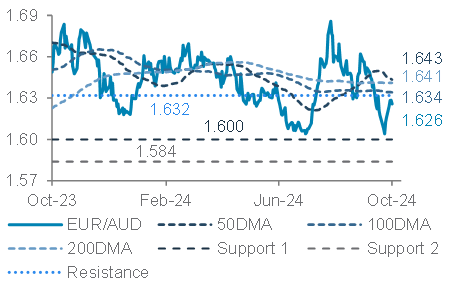
What is the impact of the latest RBI policy on India equities and onshore bonds?
In its latest monetary policy meeting, the Reserve Bank of India surprised markets by shifting its monetary policy stance to ‘Neutral’ with a unanimous vote, while keeping the policy rate unchanged with a 5:1 majority. This move comes on the back of moderating high frequency economic indicators in Q3, after a lacklustre GDP and earnings growth reported in the previous quarter.
In our view, this move affords RBI the flexibility to remain vigilant on inflation, which it expects to surge in coming months amid food price volatility, while retaining the option to cut policy rates later, should growth concerns persist.
We see this dovish shift as positive for Indian assets. Historically, domestic bond yields decline heading into the start of an RBI easing cycle and continue the downward trend over the next 6-12 months. This supports our preference for India onshore bonds. A gradual decline in real rates from current levels should assuage concerns on India’s robust growth and earnings momentum, supporting equities performance. Additionally, narrowing relative valuation premiums after the recent underperformance of Indian equities and low foreign investor positioning support our preference for India’s large cap equities.
FTSE Russell’s recent inclusion of India into the Emerging Market Government Bond Index (EMGBI) (third global index provider to do so in a year) reinforces our argument on the increasing maturity of, and access to, Indian financial market assets. This allows global investors to diversify across new sources of opportunities in India’s large and liquid capital markets while being selective in risk taking.
— Ravi Kumar Singh, Chief Investment Strategist, India
Foreign investor flows into Indian equities remain volatile; record domestic flows provide resilience
YTD 2024 cumulative flows into Indian equities (USD bn)
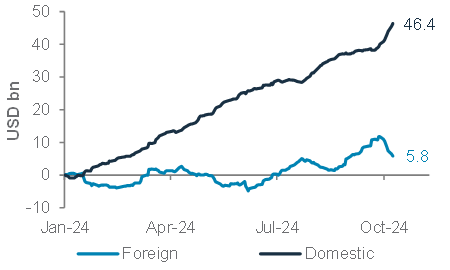
India’s valuation premiums over peers have narrowed from peak levels
MSCI India valuation premium over MSCI Asia-ex-Japan (12-month forward PE)
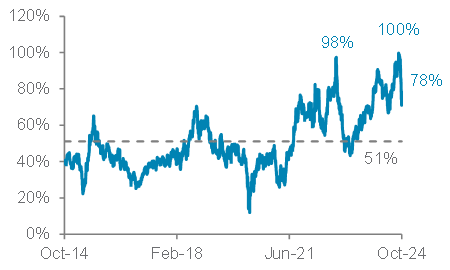
India’s growth and earnings outlook remain strong
MSCI India earnings and GDP growth estimates
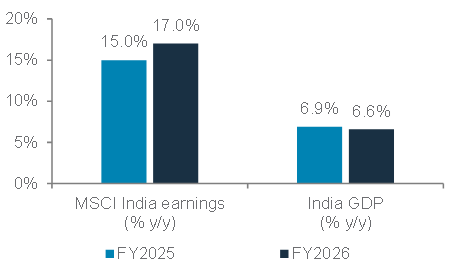
Market performance summary*
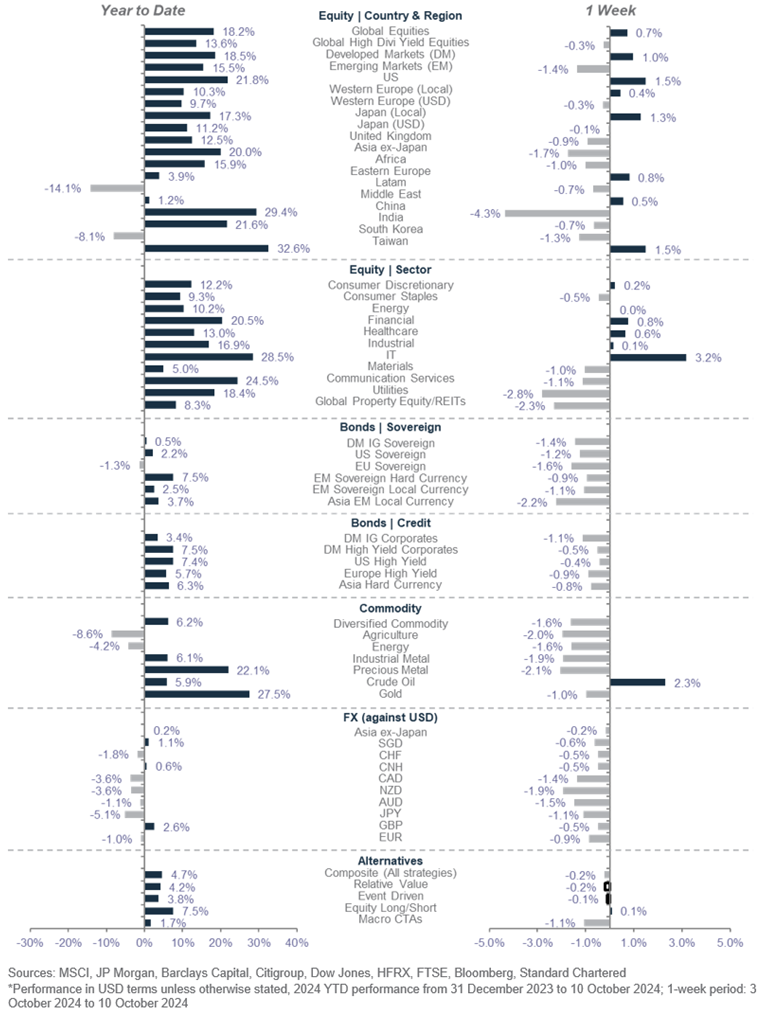
Our 12-month asset class views at a glance
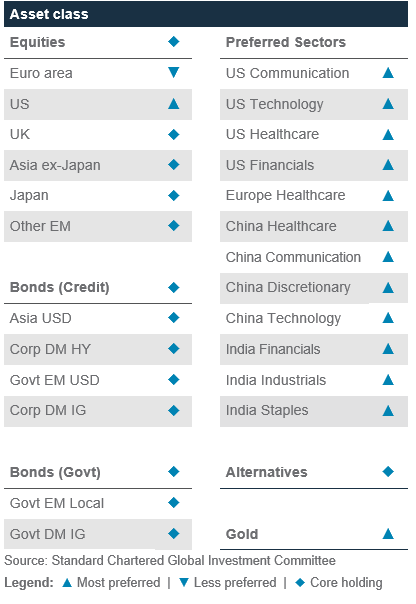
Economic and market calendar
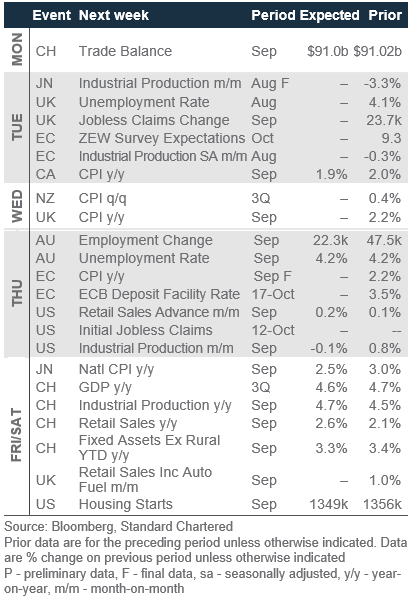
The S&P500 has next interim resistance at 5,916
Technical indicators for key markets as of 10 October close
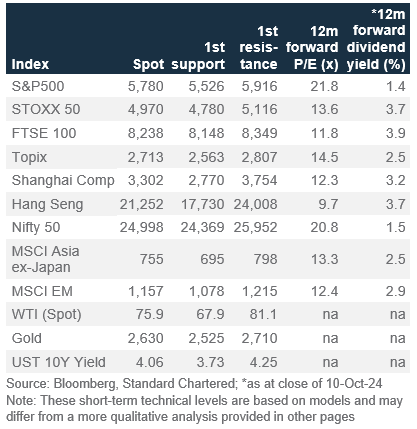
Investor diversity has normalised across asset classes
Our proprietary market diversity indicators as of 10 Oct close
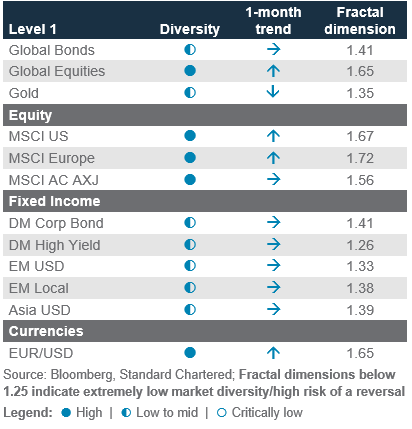

Disclosure
This document is confidential and may also be privileged. If you are not the intended recipient, please destroy all copies and notify the sender immediately. This document is being distributed for general information only and is subject to the relevant disclaimers available at our Standard Chartered website under Regulatory disclosures. It is not and does not constitute research material, independent research, an offer, recommendation or solicitation to enter into any transaction or adopt any hedging, trading or investment strategy, in relation to any securities or other financial instruments. This document is for general evaluation only. It does not take into account the specific investment objectives, financial situation or particular needs of any particular person or class of persons and it has not been prepared for any particular person or class of persons. You should not rely on any contents of this document in making any investment decisions. Before making any investment, you should carefully read the relevant offering documents and seek independent legal, tax and regulatory advice. In particular, we recommend you to seek advice regarding the suitability of the investment product, taking into account your specific investment objectives, financial situation or particular needs, before you make a commitment to purchase the investment product. Opinions, projections and estimates are solely those of SC at the date of this document and subject to change without notice. Past performance is not indicative of future results and no representation or warranty is made regarding future performance. The value of investments, and the income from them, can go down as well as up, and you may not recover the amount of your original investment. You are not certain to make a profit and may lose money. Any forecast contained herein as to likely future movements in rates or prices or likely future events or occurrences constitutes an opinion only and is not indicative of actual future movements in rates or prices or actual future events or occurrences (as the case may be). This document must not be forwarded or otherwise made available to any other person without the express written consent of the Standard Chartered Group (as defined below). Standard Chartered Bank is incorporated in England with limited liability by Royal Charter 1853 Reference Number ZC18. The Principal Office of the Company is situated in England at 1 Basinghall Avenue, London, EC2V 5DD. Standard Chartered Bank is authorised by the Prudential Regulation Authority and regulated by the Financial Conduct Authority and Prudential Regulation Authority. Standard Chartered PLC, the ultimate parent company of Standard Chartered Bank, together with its subsidiaries and affiliates (including each branch or representative office), form the Standard Chartered Group. Standard Chartered Private Bank is the private banking division of Standard Chartered. Private banking activities may be carried out internationally by different legal entities and affiliates within the Standard Chartered Group (each an “SC Group Entity”) according to local regulatory requirements. Not all products and services are provided by all branches, subsidiaries and affiliates within the Standard Chartered Group. Some of the SC Group Entities only act as representatives of Standard Chartered Private Bank and may not be able to offer products and services or offer advice to clients.
Copyright © 2024, Accounting Research & Analytics, LLC d/b/a CFRA (and its affiliates, as applicable). Reproduction of content provided by CFRA in any form is prohibited except with the prior written permission of CFRA. CFRA content is not investment advice and a reference to or observation concerning a security or investment provided in the CFRA SERVICES is not a recommendation to buy, sell or hold such investment or security or make any other investment decisions. The CFRA content contains opinions of CFRA based upon publicly-available information that CFRA believes to be reliable and the opinions are subject to change without notice. This analysis has not been submitted to, nor received approval from, the United States Securities and Exchange Commission or any other regulatory body. While CFRA exercised due care in compiling this analysis, CFRA, ITS THIRD-PARTY SUPPLIERS, AND ALL RELATED ENTITIES SPECIFICALLY DISCLAIM ALL WARRANTIES, EXPRESS OR IMPLIED, INCLUDING, BUT NOT LIMITED TO, ANY WARRANTIES OF MERCHANTABILITY OR FITNESS FOR A PARTICULAR PURPOSE OR USE, to the full extent permitted by law, regarding the accuracy, completeness, or usefulness of this information and assumes no liability with respect to the consequences of relying on this information for investment or other purposes. No content provided by CFRA (including ratings, credit-related analyses and data, valuations, model, software or other application or output therefrom) or any part thereof may be modified, reverse engineered, reproduced or distributed in any form by any means, or stored in a database or retrieval system, without the prior written permission of CFRA, and such content shall not be used for any unlawful or unauthorized purposes. CFRA and any third-party providers, as well as their directors, officers, shareholders, employees or agents do not guarantee the accuracy, completeness, timeliness or availability of such content. In no event shall CFRA, its affiliates, or their third-party suppliers be liable for any direct, indirect, special, or consequential damages, costs, expenses, legal fees, or losses (including lost income or lost profit and opportunity costs) in connection with a subscriber’s, subscriber’s customer’s, or other’s use of CFRA’s content.
Market Abuse Regulation (MAR) Disclaimer
Banking activities may be carried out internationally by different branches, subsidiaries and affiliates within the Standard Chartered Group according to local regulatory requirements. Opinions may contain outright “buy”, “sell”, “hold” or other opinions. The time horizon of this opinion is dependent on prevailing market conditions and there is no planned frequency for updates to the opinion. This opinion is not independent of Standard Chartered Group’s trading strategies or positions. Standard Chartered Group and/or its affiliates or its respective officers, directors, employee benefit programmes or employees, including persons involved in the preparation or issuance of this document may at any time, to the extent permitted by applicable law and/or regulation, be long or short any securities or financial instruments referred to in this document or have material interest in any such securities or related investments. Therefore, it is possible, and you should assume, that Standard Chartered Group has a material interest in one or more of the financial instruments mentioned herein. Please refer to our Standard Chartered website under Regulatory disclosures for more detailed disclosures, including past opinions/ recommendations in the last 12 months and conflict of interests, as well as disclaimers. A covering strategist may have a financial interest in the debt or equity securities of this company/issuer. This document must not be forwarded or otherwise made available to any other person without the express written consent of Standard Chartered Group.
Sustainable Investments
Any ESG data used or referred to has been provided by Morningstar, Sustainalytics, MSCI or Bloomberg. Refer to 1) Morningstar website under Sustainable Investing, 2) Sustainalytics website under ESG Risk Ratings, 3) MCSI website under ESG Business Involvement Screening Research and 4) Bloomberg green, social & sustainability bonds guide for more information. The ESG data is as at the date of publication based on data provided, is for informational purpose only and is not warranted to be complete, timely, accurate or suitable for a particular purpose, and it may be subject to change. Sustainable Investments (SI): This refers to funds that have been classified as ‘Sustainable Investments’ by Morningstar. SI funds have explicitly stated in their prospectus and regulatory filings that they either incorporate ESG factors into the investment process or have a thematic focus on the environment, gender diversity, low carbon, renewable energy, water or community development. For equity, it refers to shares/stocks issued by companies with Sustainalytics ESG Risk Rating of Low/Negligible. For bonds, it refers to debt instruments issued by issuers with Sustainalytics ESG Risk Rating of Low/Negligible, and/or those being certified green, social, sustainable bonds by Bloomberg. For structured products, it refers to products that are issued by any issuer who has a Sustainable Finance framework that aligns with Standard Chartered’s Green and Sustainable Product Framework, with underlying assets that are part of the Sustainable Investment universe or separately approved by Standard Chartered’s Sustainable Finance Governance Committee. Sustainalytics ESG risk ratings shown are factual and are not an indicator that the product is classified or marketed as “green”, “sustainable” or similar under any particular classification system or framework.
Country/Market Specific Disclosures
Botswana: This document is being distributed in Botswana by, and is attributable to, Standard Chartered Bank Botswana Limited which is a financial institution licensed under the Section 6 of the Banking Act CAP 46.04 and is listed in the Botswana Stock Exchange. Brunei Darussalam: This document is being distributed in Brunei Darussalam by, and is attributable to, Standard Chartered Bank (Brunei Branch) | Registration Number RFC/61 and Standard Chartered Securities (B) Sdn Bhd | Registration Number RC20001003. Standard Chartered Bank is incorporated in England with limited liability by Royal Charter 1853 Reference Number ZC18. Standard Chartered Securities (B) Sdn Bhd is a limited liability company registered with the Registry of Companies with Registration Number RC20001003 and licensed by Brunei Darussalam Central Bank as a Capital Markets Service License Holder with License Number BDCB/R/CMU/S3-CL and it is authorised to conduct Islamic investment business through an Islamic window. China Mainland: This document is being distributed in China by, and is attributable to, Standard Chartered Bank (China) Limited which is mainly regulated by National Financial Regulatory Administration (NFRA), State Administration of Foreign Exchange (SAFE), and People’s Bank of China (PBOC). Hong Kong: In Hong Kong, this document, except for any portion advising on or facilitating any decision on futures contracts trading, is distributed by Standard Chartered Bank (Hong Kong) Limited (“SCBHK”), a subsidiary of Standard Chartered PLC. SCBHK has its registered address at 32/F, Standard Chartered Bank Building, 4-4A Des Voeux Road Central, Hong Kong and is regulated by the Hong Kong Monetary Authority and registered with the Securities and Futures Commission (“SFC”) to carry on Type 1 (dealing in securities), Type 4 (advising on securities), Type 6 (advising on corporate finance) and Type 9 (asset management) regulated activity under the Securities and Futures Ordinance (Cap. 571) (“SFO”) (CE No. AJI614). The contents of this document have not been reviewed by any regulatory authority in Hong Kong and you are advised to exercise caution in relation to any offer set out herein. If you are in doubt about any of the contents of this document, you should obtain independent professional advice. Any product named herein may not be offered or sold in Hong Kong by means of any document at any time other than to “professional investors” as defined in the SFO and any rules made under that ordinance. In addition, this document may not be issued or possessed for the purposes of issue, whether in Hong Kong or elsewhere, and any interests may not be disposed of, to any person unless such person is outside Hong Kong or is a “professional investor” as defined in the SFO and any rules made under that ordinance, or as otherwise may be permitted by that ordinance. In Hong Kong, Standard Chartered Private Bank is the private banking division of SCBHK, a subsidiary of Standard Chartered PLC. Ghana: Standard Chartered Bank Ghana Limited accepts no liability and will not be liable for any loss or damage arising directly or indirectly (including special, incidental or consequential loss or damage) from your use of these documents. Past performance is not indicative of future results and no representation or warranty is made regarding future performance. You should seek advice from a financial adviser on the suitability of an investment for you, taking into account these factors before making a commitment to invest in an investment. To unsubscribe from receiving further updates, please send an email to feedback.ghana@sc.com. Please do not reply to this email. Call our Priority Banking on 0302610750 for any questions or service queries. You are advised not to send any confidential and/or important information to Standard Chartered via e-mail, as Standard Chartered makes no representations or warranties as to the security or accuracy of any information transmitted via e-mail. Standard Chartered shall not be responsible for any loss or damage suffered by you arising from your decision to use e-mail to communicate with the Bank. India: This document is being distributed in India by Standard Chartered in its capacity as a distributor of mutual funds and referrer of any other third party financial products. Standard Chartered does not offer any ‘Investment Advice’ as defined in the Securities and Exchange Board of India (Investment Advisers) Regulations, 2013 or otherwise. Services/products related securities business offered by Standard Charted are not intended for any person, who is a resident of any jurisdiction, the laws of which imposes prohibition on soliciting the securities business in that jurisdiction without going through the registration requirements and/or prohibit the use of any information contained in this document. Indonesia: This document is being distributed in Indonesia by Standard Chartered Bank, Indonesia branch, which is a financial institution licensed, registered and supervised by Otoritas Jasa Keuangan (Financial Service Authority). Jersey: In Jersey, Standard Chartered Private Bank is the Registered Business Name of the Jersey Branch of Standard Chartered Bank. The Jersey Branch of Standard Chartered Bank is regulated by the Jersey Financial Services Commission. Copies of the latest audited accounts of Standard Chartered Bank are available from its principal place of business in Jersey: PO Box 80, 15 Castle Street, St Helier, Jersey JE4 8PT. Standard Chartered Bank is incorporated in England with limited liability by Royal Charter in 1853 Reference Number ZC 18. The Principal Office of the Company is situated in England at 1 Basinghall Avenue, London, EC2V 5DD. Standard Chartered Bank is authorised by the Prudential Regulation Authority and regulated by the Financial Conduct Authority and Prudential Regulation Authority. The Jersey Branch of Standard Chartered Bank is also an authorised financial services provider under license number 44946 issued by the Financial Sector Conduct Authority of the Republic of South Africa. Jersey is not part of the United Kingdom and all business transacted with Standard Chartered Bank, Jersey Branch and other SC Group Entity outside of the United Kingdom, are not subject to some or any of the investor protection and compensation schemes available under United Kingdom law. Kenya: This document is being distributed in Kenya by and is attributable to Standard Chartered Bank Kenya Limited. Investment Products and Services are distributed by Standard Chartered Investment Services Limited, a wholly owned subsidiary of Standard Chartered Bank Kenya Limited that is licensed by the Capital Markets Authority in Kenya, as a Fund Manager. Standard Chartered Bank Kenya Limited is regulated by the Central Bank of Kenya. Malaysia: This document is being distributed in Malaysia by Standard Chartered Bank Malaysia Berhad (“SCBMB”). Recipients in Malaysia should contact SCBMB in relation to any matters arising from, or in connection with, this document. This document has not been reviewed by the Securities Commission Malaysia. The product lodgement, registration, submission or approval by the Securities Commission of Malaysia does not amount to nor indicate recommendation or endorsement of the product, service or promotional activity. Investment products are not deposits and are not obligations of, not guaranteed by, and not protected by SCBMB or any of the affiliates or subsidiaries, or by Perbadanan Insurans Deposit Malaysia, any government or insurance agency. Investment products are subject to investment risks, including the possible loss of the principal amount invested. SCBMB expressly disclaim any liability and responsibility for any loss arising directly or indirectly (including special, incidental or consequential loss or damage) arising from the financial losses of the Investment Products due to market condition. Nigeria: This document is being distributed in Nigeria by Standard Chartered Bank Nigeria Limited (SCB Nigeria), a bank duly licensed and regulated by the Central Bank of Nigeria. SCB Nigeria accepts no liability for any loss or damage arising directly or indirectly (including special, incidental or consequential loss or damage) from your use of these documents. You should seek advice from a financial adviser on the suitability of an investment for you, taking into account these factors before making a commitment to invest in an investment. To unsubscribe from receiving further updates, please send an email to clientcare.ng@sc.com requesting to be removed from our mailing list. Please do not reply to this email. Call our Priority Banking on 02 012772514 for any questions or service queries. Standard Chartered shall not be responsible for any loss or damage arising from your decision to send confidential and/or important information to Standard Chartered via e-mail, as Standard Chartered makes no representations or warranties as to the security or accuracy of any information transmitted via e-mail. Pakistan: This document is being distributed in Pakistan by, and attributable to Standard Chartered Bank (Pakistan) Limited having its registered office at PO Box 5556, I.I Chundrigar Road Karachi, which is a banking company registered with State Bank of Pakistan under Banking Companies Ordinance 1962 and is also having licensed issued by Securities & Exchange Commission of Pakistan for Security Advisors. Standard Chartered Bank (Pakistan) Limited acts as a distributor of mutual funds and referrer of other third-party financial products. Singapore: This document is being distributed in Singapore by, and is attributable to, Standard Chartered Bank (Singapore) Limited (Registration No. 201224747C/ GST Group Registration No. MR-8500053-0, “SCBSL”). Recipients in Singapore should contact SCBSL in relation to any matters arising from, or in connection with, this document. SCBSL is an indirect wholly owned subsidiary of Standard Chartered Bank and is licensed to conduct banking business in Singapore under the Singapore Banking Act, 1970. Standard Chartered Private Bank is the private banking division of SCBSL. IN RELATION TO ANY SECURITY OR SECURITIES-BASED DERIVATIVES CONTRACT REFERRED TO IN THIS DOCUMENT, THIS DOCUMENT, TOGETHER WITH THE ISSUER DOCUMENTATION, SHALL BE DEEMED AN INFORMATION MEMORANDUM (AS DEFINED IN SECTION 275 OF THE SECURITIES AND FUTURES ACT, 2001 (“SFA”)). THIS DOCUMENT IS INTENDED FOR DISTRIBUTION TO ACCREDITED INVESTORS, AS DEFINED IN SECTION 4A(1)(a) OF THE SFA, OR ON THE BASIS THAT THE SECURITY OR SECURITIES-BASED DERIVATIVES CONTRACT MAY ONLY BE ACQUIRED AT A CONSIDERATION OF NOT LESS THAN S$200,000 (OR ITS EQUIVALENT IN A FOREIGN CURRENCY) FOR EACH TRANSACTION. Further, in relation to any security or securities-based derivatives contract, neither this document nor the Issuer Documentation has been registered as a prospectus with the Monetary Authority of Singapore under the SFA. Accordingly, this document and any other document or material in connection with the offer or sale, or invitation for subscription or purchase, of the product may not be circulated or distributed, nor may the product be offered or sold, or be made the subject of an invitation for subscription or purchase, whether directly or indirectly, to persons other than a relevant person pursuant to section 275(1) of the SFA, or any person pursuant to section 275(1A) of the SFA, and in accordance with the conditions specified in section 275 of the SFA, or pursuant to, and in accordance with the conditions of, any other applicable provision of the SFA. In relation to any collective investment schemes referred to in this document, this document is for general information purposes only and is not an offering document or prospectus (as defined in the SFA). This document is not, nor is it intended to be (i) an offer or solicitation of an offer to buy or sell any capital markets product; or (ii) an advertisement of an offer or intended offer of any capital markets product. Deposit Insurance Scheme: Singapore dollar deposits of non-bank depositors are insured by the Singapore Deposit Insurance Corporation, for up to S$100,000 in aggregate per depositor per Scheme member by law. Foreign currency deposits, dual currency investments, structured deposits and other investment products are not insured. This advertisement has not been reviewed by the Monetary Authority of Singapore. Taiwan: SC Group Entity or Standard Chartered Bank (Taiwan) Limited (“SCB (Taiwan)”) may be involved in the financial instruments contained herein or other related financial instruments. The author of this document may have discussed the information contained herein with other employees or agents of SC or SCB (Taiwan). The author and the above-mentioned employees of SC or SCB (Taiwan) may have taken related actions in respect of the information involved (including communication with customers of SC or SCB (Taiwan) as to the information contained herein). The opinions contained in this document may change, or differ from the opinions of employees of SC or SCB (Taiwan). SC and SCB (Taiwan) will not provide any notice of any changes to or differences between the above-mentioned opinions. This document may cover companies with which SC or SCB (Taiwan) seeks to do business at times and issuers of financial instruments. Therefore, investors should understand that the information contained herein may serve as specific purposes as a result of conflict of interests of SC or SCB (Taiwan). SC, SCB (Taiwan), the employees (including those who have discussions with the author) or customers of SC or SCB (Taiwan) may have an interest in the products, related financial instruments or related derivative financial products contained herein; invest in those products at various prices and on different market conditions; have different or conflicting interests in those products. The potential impacts include market makers’ related activities, such as dealing, investment, acting as agents, or performing financial or consulting services in relation to any of the products referred to in this document. UAE: DIFC – Standard Chartered Bank is incorporated in England with limited liability by Royal Charter 1853 Reference Number ZC18.The Principal Office of the Company is situated in England at 1 Basinghall Avenue, London, EC2V 5DD. Standard Chartered Bank is authorised by the Prudential Regulation Authority and regulated by the Financial Conduct Authority and Prudential Regulation Authority. Standard Chartered Bank, Dubai International Financial Centre having its offices at Dubai International Financial Centre, Building 1, Gate Precinct, P.O. Box 999, Dubai, UAE is a branch of Standard Chartered Bank and is regulated by the Dubai Financial Services Authority (“DFSA”). This document is intended for use only by Professional Clients and is not directed at Retail Clients as defined by the DFSA Rulebook. In the DIFC we are authorised to provide financial services only to clients who qualify as Professional Clients and Market Counterparties and not to Retail Clients. As a Professional Client you will not be given the higher retail client protection and compensation rights and if you use your right to be classified as a Retail Client we will be unable to provide financial services and products to you as we do not hold the required license to undertake such activities. For Islamic transactions, we are acting under the supervision of our Shariah Supervisory Committee. Relevant information on our Shariah Supervisory Committee is currently available on the Standard Chartered Bank website in the Islamic banking section. For residents of the UAE – Standard Chartered Bank UAE does not provide financial analysis or consultation services in or into the UAE within the meaning of UAE Securities and Commodities Authority Decision No. 48/r of 2008 concerning financial consultation and financial analysis. Uganda: Our Investment products and services are distributed by Standard Chartered Bank Uganda Limited, which is licensed by the Capital Markets Authority as an investment adviser. United Kingdom: In the UK, Standard Chartered Bank is authorised by the Prudential Regulation Authority and regulated by the Financial Conduct Authority and Prudential Regulation Authority. This communication has been approved by Standard Chartered Bank for the purposes of Section 21 (2) (b) of the United Kingdom’s Financial Services and Markets Act 2000 (“FSMA”) as amended in 2010 and 2012 only. Standard Chartered Bank (trading as Standard Chartered Private Bank) is also an authorised financial services provider (license number 45747) in terms of the South African Financial Advisory and Intermediary Services Act, 2002. The Materials have not been prepared in accordance with UK legal requirements designed to promote the independence of investment research, and that it is not subject to any prohibition on dealing ahead of the dissemination of investment research. Vietnam: This document is being distributed in Vietnam by, and is attributable to, Standard Chartered Bank (Vietnam) Limited which is mainly regulated by State Bank of Vietnam (SBV). Recipients in Vietnam should contact Standard Chartered Bank (Vietnam) Limited for any queries regarding any content of this document. Zambia: This document is distributed by Standard Chartered Bank Zambia Plc, a company incorporated in Zambia and registered as a commercial bank and licensed by the Bank of Zambia under the Banking and Financial Services Act Chapter 387 of the Laws of Zambia.
